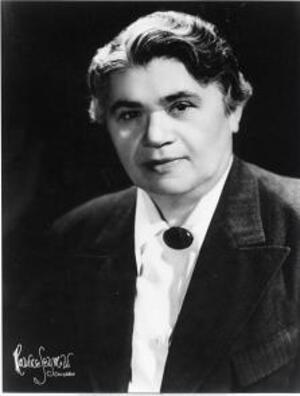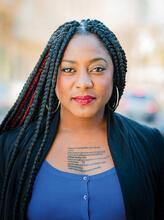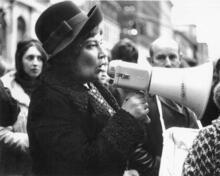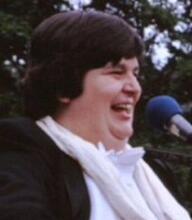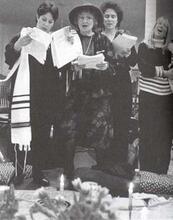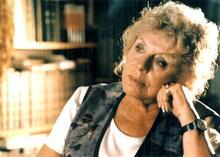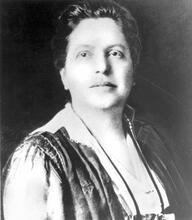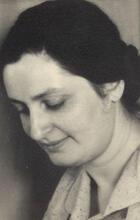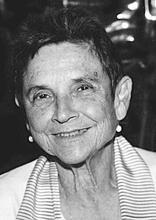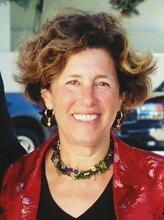Pearl Hart
Pearl M. Hart was a pioneering attorney, activist, and educator. Born to Russian Jewish immigrants, was one of the first female attorneys to specialize in criminal law. Hart devoted her life to defending the legal rights of the vulnerable and oppressed, especially women, children, immigrants, and gay men and lesbians. Although she herself never publicly identified as a lesbian, she was one of the founding members of the Chicago Mattachine Society, one of the first LGBTQ organizations in the United States, and she was known as “The Guardian Angel of Chicago’s Gay Community.”
Early Life and Education
Pearl M. Hart (Pearl Minnie Harchovsky) was a pioneering attorney, activist, and educator. Hart was born in Traverse City, Michigan, on April 7, 1890, and raised in Chicago; her parents, David and Rebecca Harchovsky, were Russian Jewish immigrants who came to the United States from Novogrudok (today Navahrudak, Belarus) in 1887. Hart’s father was an Orthodox rabbi and shohet (ritual butcher), and Hart recalled her childhood home as “particularly fortunate, in that everyone loved me a lot and spoiled me.”
As a young woman, she began using the last name Hart “for business reasons and convenience” (as she later testified), and she was known for the rest of her life as Pearl M. Hart. While working as a stenographer, she took night classes at the John Marshall Law School and was admitted to the Illinois Bar in 1914. A founding member of both the National Lawyers Guild and the American Committee for the Protection of the Foreign Born, she was one of the first female attorneys to specialize in criminal law. She practiced law for 61 years, working until just weeks before her death.
Defending the Vulnerable and Oppressed
Hart devoted her career to defending the rights of the vulnerable and oppressed, especially women, children, immigrants, and gay men and lesbians. Her long-time friend, Chicago journalist Studs Terkel, often told the story of one memorable court hearing, which to him epitomized Hart’s work (as well as her imposing physical stature, standing just half an inch shy of six feet):
“My wife was a social worker at the time the Great American Depression was on. She was in Women’s Court, and one of her clients was a young girl arrested for being a hooker. A hooker! She wanted two bucks to buy a pair of shoes, the Depression was that deep. She was arrested, and there was Pearl Hart, her public defender. The judge … was an illiterate, brutish lout of a guy who humiliated this girl, especially upon discovering that the trick with whom she was picked up was a black man. My wife remembered one thing: this girl just shrivelling, and Pearl putting her hand on the girl’s shoulder and the girl straightening out — she never forgot that moment. This was Pearl.”
Hart would later recall with pride that when she first began working as a public defender in “morals court” with women arrested for alleged prostitution, the conviction rate was 90 percent, but after four years of her work, the conviction rate had dropped to 10 percent, with 90 percent of women going free. In the 1950s, she devoted herself to defending clients subpoenaed by the House of Representatives Un-American Activities Committee (HUAC) and represented many gay men arrested in bar raids or police stings.
In addition to her legal work, Hart taught at John Marshall Law School and at the Northwestern University School of Social Work, and she participated actively in local and national progressive politics. She spoke regularly at Chicago-area organizations, both Jewish and non-Jewish, and served as a mentor to a generation of female law students. In 1964, Hart was honored with an honorary doctorate of law from John Marshall, which described her as “a pioneer and exemplar … an imperturbable trial advocate and a scholar of ingenuity as well as intellect … a source of radiant confidence in the ultimate supremacy of the law and the goodness of man.” Throughout it all, she maintained a humble focus on the importance of her work defending civil liberties for all.
Involvement in Gay/Lesbian Activism
Unlike her visibility in progressive politics, one important facet of Hart’s life was kept more private: her sexuality. Hart had two long-term female partners — singer and actress Blossom Churan and writer and activist Valorie Taylor — and worked for decades in support of gay and lesbian organizations, although she herself never publicly identified as a lesbian. Historian Timothy Stewart-Winter termed Hart “the crucial figure in the emergence of the homophile movement in Chicago.” Hart was one of the founding members of the Chicago branch of the Mattachine Society, one of the first LGBTQ organizations in the United States. Chicago Mattachine operated from 1954 to 1958 and was revived in 1965 as Mattachine Midwest, and Hart was involved in both incarnations as a “professional legal advisor.”
In 1957, Hart published a booklet with Chicago Mattachine, entitled Your Legal Rights, that offered legal advice to gay men and lesbians worried about arrest and harassment. In Your Legal Rights and in several public talks she gave at Mattachine on the topic, Hart emphasized that “people must realize that they are as they are, and whether or not they have engaged in conduct proscribed by the law at the time of arrest, they still have rights guaranteed by federal and state laws.” Her friend Jim Bradford, president of Mattachine Midwest, recalled that Hart also covertly assisted Mattachine members by passing along information about problematic officers and planned stings. Her reputation as an unflinching defender of civil rights for gays and lesbians gave her the nickname “The Guardian Angel of Chicago’s Gay Community.”
Hart frequently spoke to Jewish organizations about her work, and described her own career as inspired by the Jewish ideals of striving for freedom and justice. At her 60th birthday party, she alluded to her birth during the week of Passover, saying that “I was born in a season when my people celebrate their freedom from bondage... Perhaps the desire for freedom and brotherhood have conditioned me to the work in which I find the greatest inner response” (Chicago Historical Society). According to her biographer Karen Sendziak, Hart once remarked sadly to Jim Bradford that she would have no one to recite the kaddish (the mourner’s prayer) for her after her death, but he reassured her that all the members of the organization were her children, and that they would all gladly say kaddish for her.
When Hart was hospitalized with pancreatic cancer in 1975, her partner Val Taylor was refused entry to her room under hospital policy to admit family members only, until Hart’s protégée, attorney Renee Hanover, intervened. By then Hart had slipped into a coma from which she did not wake. Hart died on March 22, 1975.
In 1981, the newly organized Midwest Gay and Lesbian Archive and Library chose to honor Hart, along with Chicago activist Henry Gerber, by naming themselves The Henry Gerber-Pearl M. Hart Library: The Midwest Lesbian and Gay Resource Center (now the Gerber-Hart Library and Archives). In 1991, Hart was inducted into the Chicago Gay and Lesbian Hall of Fame, and in 2001 the municipal government awarded her a Chicago Tribute Marker of Distinction, placing a memorial plaque outside her home in commemoration of her contributions to the city.
De la Croix, St. Sukie. Chicago Whispers: A History of LGBT Chicago before Stonewall. Madison, WI: University of Wisconsin Press, 2012.
Kuda, Marie J. “Legal Pioneer: Pearl M. Hart, 1890-1975.” In Tracy Baim, Out and Proud in Chicago: An Overview of the City’s Gay Community, edited by Tracy Baim, 26-27. Evanston, IL: Agate Surry, 2008.
Peart M. Hart Papers, Chicago Historical Society.
Sendziak, Karen C. “Pearl M. Hart (1890-1975).” In Vern L. Bullough, Before Stonewall: Activists for Gay and Lesbian Rights in Historical Context, edited by Vern L. Bullough, 56-62. New York: Harrington Park Press, 2002.
Sienna, Noam, ed. A Rainbow Thread: An Anthology of Queer Jewish Texts from the First Century to 1969. Philadelphia: Print-O-Craft Press, 2019.
Stewart-Winter, Timothy. Queer Clout: Chicago and the Rise of Gay Politics. University of Pennsylvania Press, 2016.
Terkel, Studs. “The Brass Check and Thomas Paine.” In Kevin Barnhurst, Media Q: Media/queered : Visibility and Its Discontents, edited by Kevin Barnhurst, 73-80. New York City: Peter Lang Publishing, 2007.

